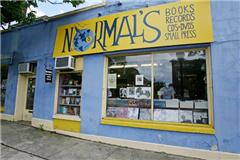March 18th, 2010 / 3:11 pm
Behind the Scenes & Q & A
Bookstore Interview: Normal’s Books & Records, Baltimore
 Google “Baltimore used bookstore” and click “I’m feeling lucky.” You will be. The first hit is Normal’s Books & Records, one of the best used shops I’ve ever been to. It isn’t just the selection that makes it great, though it’s clear that Rupert Wondolowski, who runs the buying there, knows great literature beyond the classics. It isn’t just the personality of the store, even though there are plenty of funny signs and doodads around to keep your friends interested while you spend an hour searching for some lost dub record. What I like best about Normal’s is: dang, they are invested in the local arts scene. Aside from stocking all the amazing books, music, zines etc. that get put out around town, the collective hosts weekly shows at the Red Room, which is attached to the store, Rupert runs an always-interesting reading/performance series called “Shattered Wig Night” and he also puts out an old-school tape-up journal called The Shattered Wig Review. Oh yeah, and he wrote a pretty dynamite book called The Origin of Paranoia as a Heated Mole Suit (Publishing Genius 2008). Interview about bookselling after the break.
Google “Baltimore used bookstore” and click “I’m feeling lucky.” You will be. The first hit is Normal’s Books & Records, one of the best used shops I’ve ever been to. It isn’t just the selection that makes it great, though it’s clear that Rupert Wondolowski, who runs the buying there, knows great literature beyond the classics. It isn’t just the personality of the store, even though there are plenty of funny signs and doodads around to keep your friends interested while you spend an hour searching for some lost dub record. What I like best about Normal’s is: dang, they are invested in the local arts scene. Aside from stocking all the amazing books, music, zines etc. that get put out around town, the collective hosts weekly shows at the Red Room, which is attached to the store, Rupert runs an always-interesting reading/performance series called “Shattered Wig Night” and he also puts out an old-school tape-up journal called The Shattered Wig Review. Oh yeah, and he wrote a pretty dynamite book called The Origin of Paranoia as a Heated Mole Suit (Publishing Genius 2008). Interview about bookselling after the break.
How do you describe Normal’s to people in Arizona, if they seem genuinely interested?
First off, they must be warned that if they come in summer Baltimore heat is like a wet suction cup around the brain, not at all like their dry heat that has kept John McCain preserved and looking only 70 when he is actually a 300-year-old extraterrestrial.
Normal’s is an organic farm of cultural livestock. We serve a diverse community books, records and CDs, so you might find a copy of Jim Thompson’s Savage Night as well as a CD by The Jelly Roll Kings. We are located in the proximity of 3 universities and have a broad scholarly stock of books, including a huge philosophy section and a very fine Greek and Roman literature section. But within this solid base spanning the history of thought you will find pockets of sweet subversion and alternate universes.
When we opened in 1990 we thought primarily of ourselves as a great bookstore that happened to have vinyl records and CDs also. The vile plastic CD with its insidious tiny print was in its heyday and there were actually those who mocked us for carrying vinyl (of course most of them were government plants, but still . . .) Now, nineteen years later records are red hot, needing to die for American vampire culture to find them sexy again.
So how do record sales compare to book sales?
The book to record ratio is hard to call. But probably year round it works out to about 60% books to 40% records, with records selling more in the summer and books more in the winter.
So Normal’s has been around for 20 years? What are some of the changes you’ve seen over that time?
I think I might have partially answered this one. Due to the internet eroding a lot of the classic model book-browsing culture, our own burden called “The Book Thing” (more on that to come in ensuing questions) and our abiding love for vinyl records and their resurrection, we have shifted somewhat in our perception of ourselves and our actual sales into very much a book AND record store.
In the last five years or so, to compete with Amazon and all the armchair shopping we’ve had to sell a lot more online. Bending to Amazon’s power. Because the internet portals of course get their cut we basically have to work almost twice as hard to almost make what we did back in the halcyon days of Bill Clinton’s tumescent economy.
What about online sales? Has technology made an impact on the bookstore? Like, are you selling way fewer books now than you were 15 years ago?
We’re definitely selling fewer books, but it has caused us to be more picky and specialized. We now make more use of technology to turn the hoodoo around.
Over the last few years our online sales have had to expand, but we are unique in that the majority of our sales are still in person. But it’s probably a 60/40 split at this point.
What about dudes that travel from all over the country to buy large amounts of books from you — doesn’t that happen?
We do get visitors from all over, especially record dealers. Before the great Depression That Couldn’t Be Called a Depression, we probably got Japanese and/or German record dealers in once a week or so. Since George W. pulled his bloodied jaws off the American corpse it’s probably more like once a month or two.
But the world of serious book and record collectors is a small, supportive one. Word gets around through word of mouth. And at this point we’ve even got a plug in Rolling Stone magazine, so that helps.
 Sometimes I talk to you and think, “Whoa, Rupert is like a real businessman.” Do you feel like you have developed skills in that area, or does it come natural to you? Do you recognize a difference between your business smarts and your other smarts?
Sometimes I talk to you and think, “Whoa, Rupert is like a real businessman.” Do you feel like you have developed skills in that area, or does it come natural to you? Do you recognize a difference between your business smarts and your other smarts?
Why thank you, seňor. I think. I’ve been in the book business since 1982 and so has one of the other owners. I think I’ve gotten tougher and pickier over the years as far as what we buy and making sure we get a decent markup, but hopefully from the beginning my/our love and knowledge of what we’re dealing with was in place. At my advanced age and the disappearance of a lot of what I hold/held dear, but I’m not sure about a lot, especially the shape or existence of my smarts. I’ve always thought I had good instincts in art and business. And well-shaped nalgas.
Normal’s is run collectively, right? Does that help account for your longevity?
Normal’s was started in 1990 by nine equal co-owners as a collectively run sub-S corporation (still not sure exactly what a “sub-S” corporation is). Having so many people with different skills and interests in the beginning really helped keep our costs low and make us an interesting destination. It also helped to run the first few months on volunteer hours to get some capital generated. With nine people we were able to work other jobs and donate a few days a week to Normal’s for free, keeping track of the hours so that in the future there might be some compensation.
Normal’s has always been just as much a cultural endeavor as a business endeavor. With The Red Room shows and their High Zero festival plus Shattered Wig Press activity and all the talented folks that have passed through here, including the boddhisattva Blaster Al Ackerman, we’ve been a part of a community that has helped support us.
How has the Book Thing being so close affected business? (Aside to readers — Baltimore has this big free bookstore called the Book Thing where people donate books and they shelved and given away for free. You just go and help yourself to as many free books as you want. Though most of the selection is total crap, and probably bed-bug ridden, it’s possible to find a surprise occasionally. The hitch is that The Book Thing gets first dibs, so your nicely donated books aren’t necessarily becoming part of the gift economy.)
Oh The Book Thing. I could go on a novella sized rant about the Book Thing. Let me start with saying that the whole idea about used bookstores is the cheapness of most of the books. It’s not like books were some high ticket luxury item that needed to be brought down to the masses. We have always had and still have books ranging in the $1 to $3 scale. And all booksellers have always given some of their books away for free. To Goodwills and libraries. Libraries are free and Goodwills employ many people. The thing that gets me about the Book Thing is that most of the books higher in value than $6 or so get sold. On ABE, Amazon, ebay, on consignment to a local high end bookstore and some are even auctioned at Sotheby’s.
Now I doubt that the administrator of the Book Thing is getting filthy rich, but there is a lot of money being made and there is no transparency to the public about what money is made and where it’s all going. There is no heat being run there in the winter other than the owner’s office and no AC in the summer (other than the owner’s office). Helpers volunteer their time and his transportation was donated. And it’s great that many books get to some people who are in the lower income bracket – although it started out in Charles Village and there was a response just short of an uproar when he announced he was moving it to Waverly, a decent neighborhood where we’re located but where a lot of his Charles Village upper class clientele for the free were concerned they might be brushing up against the underclass.
I am obviously not neutral on this issue. Since they moved directly behind us we’ve lost around $20,000 to $30,000 in sales and I see many of our former customers, a lot of whom are Hopkins professors and white collar workers, coming out of there on weekends with full boxloads.
So do you think about it all the time, about what you have to do, and how you can make it better and whether or not you want to accept Starbucks’s offer to bring in a latte machine?
I’m not exaggerating and my girlfriend Everly will attest to this, that I think about the store almost constantly. Way too much. To the point of losing sleep and stomach lining. Due to the tight capital nature of the used book business at this time and the fact that we don’t own the building we occupy there are limits to the cosmetic things we could/can do. Hopefully I remain open to the ideas of the younger people working here over the years who got us into blogging and Facebooking about the stock, which I think has helped bring in a lot of new people. That’s a huge difference since we started business. Things like the Yellow Pages and most other advertising have become almost obsolete compared to a strong web presence.
One year we splurged and took out a large Yellow Pages ad with a graphic – they literally lied to our faces about the costs and tried to charge us about five times what they said it would cost, I think they could smell their own deaths coming and were looking for prey – and we never heard one customer say they came to us through the Yellow Pages. It’s always “I Googled used bookstores in Baltimore and you were the first to pop up with all your awards and Noble Prizes and beautiful employees who are Rhode scholars and practicing physicians.”
Has running a bookstore influenced your own writing?
It’s funny because one of the main reasons all of us started Normal’s was we are/were all artists of one kind – musicians and writers mainly, but now I realize there is a kind of small business owner obsession that can cut into my writing brain. But on the other hand, through this job and the location of the store I have met an incredible assortment of people and it’s allowed me to walk into my daily job the same person I am at home (mostly). Baltimore is an incredible city of autodidacts. Edgar Cayce said something once about it all was going to go down spiritually or cosmically here and there certainly are all kinds of wild metaphysical seekers.
What’s next?
Better shelving, prettier surroundings, a cafe bakery next door and sword swallowing palm reading scantily clad book clerks.
Tags: Normal's Books, rupert wondolowski
5 Comments


















rupert! love him.
reply
Oh, I meant to say something about this interview — that I don’t often read about bookstores that are actually getting by (it seems like newspapers love writing about places going out of business, though). So what I really like about this is hearing the challenges of the business as told by someone that is still making the bookstore work.
reply